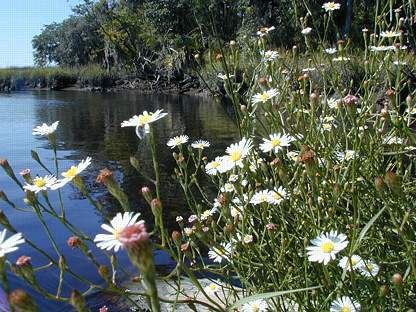|
|
Center Programs
|
|
|
|
|
 |
 Coal Ash Disposal
Coal Ash Disposal
Coal ash is a dangerous toxic waste material produced by coal-burning power plants. It contains cancer-causing
heavy-metals and radioactivity that are a risk to water, wetlands, wildlife, and public health. Millions of tons of
coal ash throughout the nation will need to be stored in a more responsible way to safeguard our communities and environment. |
|
 |
 Clean Energy & Climate Change Policy
Clean Energy & Climate Change Policy
Cumulatively enormous amounts of nitrous oxide and sulfur oxide, the most common compounds producing acid rain, as
well as mercury, a known carcinogen and threat to human central nervous systems, are released by power plants. Those most
likely to be affecting coastal Georgia are in Alabama, South Carolina, Tennessee and upstate Georgia - at least two dozen
plants are in question. The Center collaborates with other organizations in raising public awareness about the importance
of these issues and actions that can be taken to address them. |
|
 |
 Water Protection
Water Protection
Water quality and flow of water in coastal rivers is essential to the coastal environment. The region's quality of life and economy
depends fundamentally on the interrelated systems of rivers, estuaries, freshwater wetlands, tidal marshes, and groundwater. With
continuing growth throughout the region's five watersheds, there are numerous threats to coastal fisheries, water supply, and
ecosystems. The Center is working with its members, other non-profit groups, and public officials to help improve understanding
of issues, analysis of conditions, and regulatory protection of water resources. Coastal Watersheds |
|
 |
 Coastal Management
Coastal Management
(Resource conservation & assessment, sustainable fisheries, and
responsible development)
The Georgia Coastal Management Program holds great promise for improving
the availability and use of vital information needed to make wise decisions about the use and conservation of coastal resources.
Bolstered by the support of federal funding and a comprehensive guiding document, with sufficient public involvement this program
could become more effective. We are working in collaboration with other groups to help accomplish this goal through the Coastal
Advisory Council and related activities.
|
|
 |
 Jekyll Island Revelopment Issues
Jekyll Island Revelopment Issues
Jekyll Island Redevelopment Survey
In late July, the Center began conducting a brief survey of collaborating non-profit groups to determine:
(1) their preferences for the Island's redevelopment,
(2) ideas for establishing a process for overseeing that redevelopment, and
(3) how the public interest could be protected by using proper tracking and ongoing evaluation.
A compilation of survey responses and their respective sources is reported here.
|
|
 |
 Coastal Development / Smart Growth
Coastal Development / Smart Growth
Land use and development are inevitable as the coastal population continues to grow. Disturbance of natural landscapes,
wildlife habitats, and historic communities can permanently alter the visual and environmental quality that makes this region
so appealing. Not all development is equally desirable or destructive. Decisions about how, when, and where to develop can
greatly influence the degree to which coastal growth complements or contradicts the public's interest. The Center provides
guidance in advising decisionmakers about the benefits and costs of alternative development choices. |
|
 |
 Environmental Education & Values
Environmental Education & Values
To achieve significant progress toward ways of living that are more compatible with our natural environment, we must raise
awareness about the consequences of our actions - as consumers, workers, and residents. If future generations of coastal
Georgians are to enjoy the region's rich diversity of fish, wildlife, and natural landscapes, we must align economic and
political motives with those of public interest to realize a sustainable coast. This can only be accomplished through
education, and through this education, reconsideration of our basic values. In our newsletter, Works in Progress, editorials,
commentary, and public presentations, the Center strives to inform and educate our members, elected officials, landowners, and
many others whose actions affect this region's future.
|
|
 |
 Barrier Islands
Barrier Islands
To honor founding Center board member and coastal geologist, Dr. Jim Henry, upon his death in May 2010 the Center created the Jim Henry Barrier Island Fund, which helps support our work on issues related to Georgia's barrier islands. Due to the importance of these islands to Georgia's cultural history, natural beauty, and intertidal and estuarine ecosystems, the Center places high priority on their proper protection and conservation.
|
Center Programs Archive
| | ^ Top |
|
| |
| |
|
|